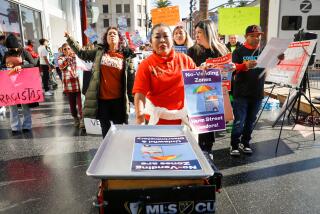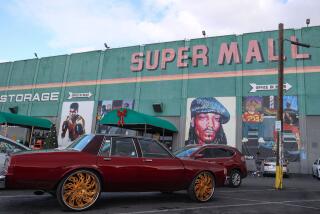West Covina May Ban Indoor Swap Meets
WEST COVINA — In what may be one of the strongest municipal actions yet taken against indoor swap meets, the City Council has given preliminary approval to an ordinance banning the cut-rate bazaars in the city.
The council Monday voted 4 to 0 to tentatively approve the ordinance, recommended by the city Planning Commission. Councilman Richard Jennings was absent. A final vote will be taken Sept. 24.
There was no public comment on the ordinance, which would amend the Zoning Code by defining and prohibiting indoor swap meets. The recommendation came after the commission received numerous requests to operate swap meets, Planning Director Pat Haley said.
The city has no swap meets, which Haley described as “multitenant retail centers” whose operators are separated by partial walls that have no doors. Other retail facilities that share space and sell similar merchandise--such as shopping malls, antique shops and jewelry marts--would be exempt because their walls go all the way to ceiling and individual stores have locking doors, she said.
Haley said planning officials were concerned that swap meets would cause traffic and parking congestion, public safety hazards, low sales revenues, and difficulty in monitoring business licenses and collection of fees and sales tax.
In 1987, Huntington Park passed an ordinance prohibiting indoor swap meets in commercial zones after more than 100 merchants on Pacific Boulevard said they did not want the establishments in their business district.
In Pasadena earlier this year, a Korean-American businessman charged racism when the city turned down his plans to open a swap meet-style store.
Steve Weiner, acting principal economist for the Southern California Assn. of Governments, noted that “a lot of immigrants use swap meets because it’s a way of making money without a lot of overhead.”
“I suspect that most cities are concerned with the fiscal impact of swap meets,” he said. “If the property is more stable, it will increase their revenue bases, revenue from sales and license taxes. Also, cities have difficulty in collecting taxes because operators are transitory.”
Sheri Erlewine, communications director for the League of California Cities, said her organization has no records on cities banning swap meets.
More to Read
Sign up for Essential California
The most important California stories and recommendations in your inbox every morning.
You may occasionally receive promotional content from the Los Angeles Times.









